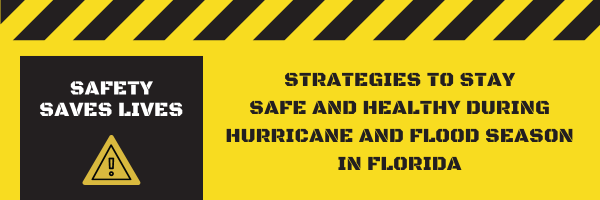
Preparation, Safety, and Personal Care for Natural Disasters in Florida
The hurricane season in Florida can be a time of great uncertainty and risk. As a real estate professional, I understand that it's essential not only to take care of our properties but also of our lives and those of our loved ones. Here, I offer you a detailed guide to staying safe and healthy during the hurricane season and the frequent floods that can accompany it.
Preparation Before Hurricane Season
- Family Emergency Plan:
- Supply Checklist: Ensure all family members know what supplies they should have on hand before a storm. Create a checklist that includes essentials like food, water, medications, and emergency tools.
- Emergency Kit:
- Essential Items: Store drinking water (at least one gallon per person per day for seven days), non-perishable food, flashlights, batteries, necessary medications, important documents, cash, and a first aid kit.
- Personal Needs: Don't forget to include specific items such as baby diapers, pet food, and any other particular needs of your family.
- Home Safety:
- Structure Inspection: Ensure your home is prepared to withstand strong winds and rains. Consider installing hurricane shutters or blinds. Remove pots and objects outside that can become projectiles.
- Drains and Gutters: Clean gutters and ensure drains are clear to prevent flooding.
During Hurricane and Floods
- Stay Informed:
- Weather Alerts: Follow weather updates through local channels, weather apps, and official social media accounts.
- Evacuation Notices: Obey evacuation orders and follow instructions from local officials.
- Personal Safety:
- Shelter in the Right Place: If you decide to stay home, take shelter in an interior room without windows on the highest floor possible.
- Avoid Floodwater: Never walk or drive through floodwaters, as they may be deep and hide dangers such as swift currents or debris.
- Last-Minute Preparation:
- Charge Devices: Ensure all mobile devices, power banks, and other electronic equipment are fully charged before the storm.
- Protection of Belongings: Place important documents in waterproof bags and ensure your valuables are in a safe and elevated place.
- Document Your Property: Take photos and videos of your property and personal belongings for insurance claims in case of damage.
If You Need to Evacuate
In case you need to evacuate, even temporarily, it's crucial to bring your medications and health information with you. Place these items in a resealable plastic bag to keep them dry and protected. This will ensure you have access to your treatments and medical history at all times, preventing health complications during the emergency.
After the Hurricane and Floods
- Health and Safety:
- Avoid Hazards: Stay away from fallen power lines, contaminated water, and damaged structures.
- Protective Gear: Wear gloves, boots, and masks when cleaning debris to prevent injuries and infections.
- Seek Help:
- Medical Assistance: Seek medical attention for any injuries or health issues.
- Assistance Programs: Take advantage of local, state, or federal assistance programs for post-disaster recovery.
- Mental Health:
- Emotional Support: Talk to family, friends, or support groups to deal with post-disaster stress and trauma.
- Professional Help: Don't hesitate to seek help from mental health professionals if you feel the situation is severely affecting you.
Specific Considerations for Florida
- Tropical Storms and Hurricanes: Florida is particularly vulnerable to these storms. Make sure you have flood and hurricane insurance.
- Flood-Prone Areas: Know if your property is in a flood zone and take necessary precautions, such as elevating electrical appliances and using water-resistant building materials.
Community Resources and Education
- Volunteering: Get involved with local disaster response organizations to help your community.
- Continuing Education: Participate in workshops and training sessions on natural disaster preparedness.
By following these recommendations and preparing properly, you can significantly improve your safety and that of your family during hurricane and flood season in Florida. Remember that preparation and information are key to facing these natural events with greater resilience and peace of mind. However, always prioritize and follow the instructions and guidelines issued by local authorities and emergency services, as they are best equipped to provide accurate and timely information during a disaster.




